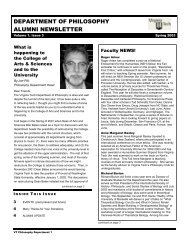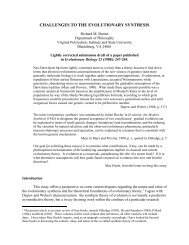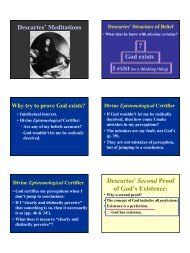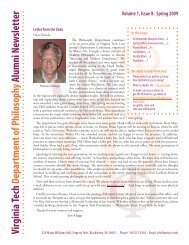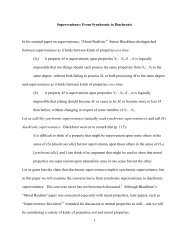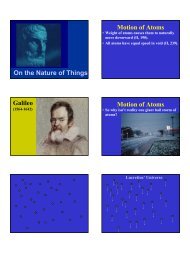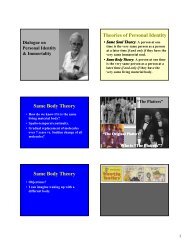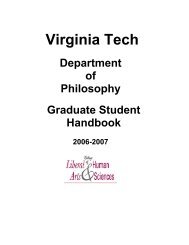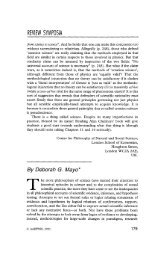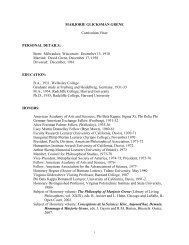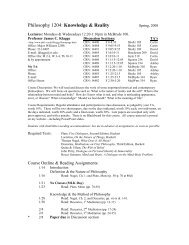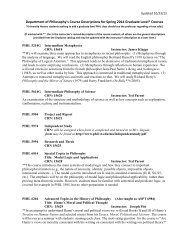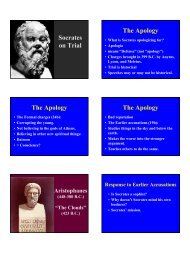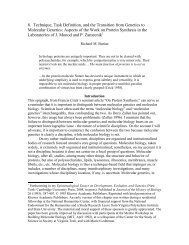Wittgenstein in Exile
Wittgenstein in Exile
Wittgenstein in Exile
You also want an ePaper? Increase the reach of your titles
YUMPU automatically turns print PDFs into web optimized ePapers that Google loves.
From this perspective it seems at least possible that the evolution from culture to<br />
civilization, or the move from one tradition to another could well affect the role of, or need for,<br />
philosophy. Though there is noth<strong>in</strong>g <strong>in</strong> <strong>Wittgenste<strong>in</strong></strong>’s or Spengler’s comments about culture and<br />
civilization to suggest that one of these is less <strong>in</strong> need of philosophy, the variability of these sorts<br />
of epochs makes it quite unlikely that an a priori case could be made for the <strong>in</strong>evitable need for<br />
philosophy. 41<br />
Still, short of (what would seem to us to be) significant mental deterioration, it is<br />
hard to imag<strong>in</strong>e what changes “would make all these questions superfluous.” 42<br />
Religion and <strong>Exile</strong><br />
Spengler’s account of religion is not all that different from his account of philosophy.<br />
Both embody the ideology of an era. However, <strong>in</strong> the case of religion, <strong>Wittgenste<strong>in</strong></strong> is not so<br />
anxious to dissent.<br />
For <strong>Wittgenste<strong>in</strong></strong>, philosophy is an activity sui generis. One who is separated from the<br />
community is well-suited to engag<strong>in</strong>g <strong>in</strong> philosophy. Religion, however, is not, <strong>in</strong> this way,<br />
someth<strong>in</strong>g wholly separate. Or rather, religion has two aspects, the <strong>in</strong>ner aspect—one’s spiritual<br />
relationship to God—and the outer aspect—one’s participation <strong>in</strong> ceremony, obedience and<br />
lov<strong>in</strong>g behavior. Not surpris<strong>in</strong>gly, <strong>Wittgenste<strong>in</strong></strong>’s engagement with religion consisted almost<br />
entirely of the former. The latter was lost on, or more difficult for, an exile without a community.<br />
Thus, I believe, we get <strong>Wittgenste<strong>in</strong></strong>’s ambiguous attitude towards religion <strong>in</strong> his own life.<br />
Of course, <strong>Wittgenste<strong>in</strong></strong> was ambivalent about be<strong>in</strong>g a philosopher, too. But it was not<br />
ambivalence about whether he could be a philosopher, or be a good one, but about whether he<br />
should be a philosopher at all. His ambivalence concern<strong>in</strong>g religion was whether he could be<br />
religious. 43<br />
He certa<strong>in</strong>ly thought he should be religious, and he wanted to be religious. While he<br />
wished for the discovery that could allow him to stop do<strong>in</strong>g philosophy when he wanted to (PI<br />
133), he never sought the discovery that would allow him to stop try<strong>in</strong>g to be religious. It was<br />
someth<strong>in</strong>g that he wanted, and worked at obsessively <strong>in</strong> certa<strong>in</strong> respects, but was unable to accept<br />
11



